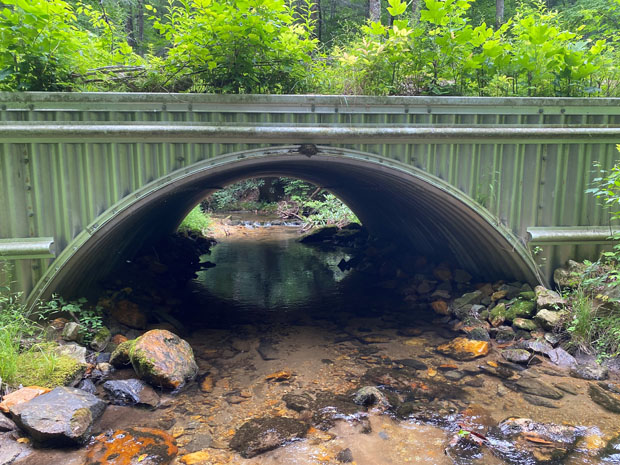Conservation in the Southern Appalachians
02 Aug 2022
Trout Unlimited establishes Sky Island Coldwater Conservation Focal Area
By Kristin E. Landfield

Unless you’re a brook trout hiding under rocks in the cool headwaters of the Tuckasegee River, it’s nearly impossible to ignore the bitter volatility shrouding our modern political scape. As a culture, we are ever-more polarized and ever-more detached from people outside our direct circles and special interests. Our social fabric continues to be washed in cloudy waters of monetized media platforms that make it hard to engage in civil conversation on nuanced topics. It’s difficult to see how we cool these incendiary arguments long enough to work towards shared goals. In a very real sense, it turns out that humble brook trout may hold the answer.
Trout Unlimited (TU) is a national non-profit organization dedicated to “protecting, reconnecting, restoring and sustaining” essential habitat and clean coldwater resources for trout and salmon populations. TU promotes this work by finding common cause through distilling their mission to a clear imperative: clean water. In doing so, they’re able to form coalitions and alliances among mixed interest groups that otherwise operate in separate, if not antagonistic, spheres. TU’s website states: “We believe in bringing all parties to the table to find proactive solutions... We work to protect important habitat, reconnect degraded waterways and restore trout populations…The best conservation work comes from true partnerships” that appeal to the conservationist and angler alike. A core objective for TU is to reconnect coldwater habitats in streams and rivers where movement has been inhibited by dams, diversions, silt, etc. Temperatures quickly rise in shallower and stagnate waters. Removal of in-stream barriers immediately assists in lowering water temperatures and improving stream ecology. Further, removal inhibits destructive flooding and subsequent bank collapse, tree canopy loss, reduces forest service maintenance, and helps aquatic species navigate the perils of climate change. Fish passage and population survival improve for miles with each barrier removed or wide-passage culvert constructed.
Private funds are a crucial component to almost every project. These funds provide a match to enlist federal and state funding, yielding more research, on-the-ground projects, and other vital endeavors. Locally, this collection of public and private money has funded several barrier removal projects, including prioritizing culvert remediation in the Cathey’s Creek watershed in Transylvania County.
One focal area, named the Sky Island Coldwater Conservation Planning area, includes the Upper Tuckasegee, the Upper French Broad, and the Upper Pigeon River Watersheds. One of the first efforts in Sky Island was a Community Science program to acquire data on threats to coldwater ecosystems. The initiative captured vital information on the nuances of conservation in the Southern Appalachians, while marshaling volunteers who are interested in understanding scientific protocols for stream population research, management and remediation projects. Participants logged thousands of hours identifying in-stream barriers, defunct culverts and bridges, eroded trails and roads that deliver sediment to coldwater streams. Using these data, TU plans to focus concentrated efforts to the Sky Island area over the next decade and has identified multiple, high-priority projects within it.
With hundreds of local chapters that connect larger goals, the initiative will capture essential information on the nuances of conservation in the Southern Appalachians, while engaging volunteers who are interested in understanding scientific protocols for stream population research, management and remediation projects. Currently, thousands of “citizen scientists” are participating in monitoring stream crossings for in-stream barriers and defunct culverts and bridges, as well as identifying eroded trails and roads that deliver sediment to coldwater streams.
With hundreds of local chapters that connect larger goals with grassroots projects, TU is also unique in its approach toward filling practical gaps in conservation efforts. There are many strong conservation groups that either work on the policy and advocacy side or on-the-ground. TU has structured its organization to address the full spectrum of need. Jeff Wright, Southern Appalachian Project Manager for TU, spends much of his time as a liaison coordinating diverse parties toward the execution of a project. TU’s ability to provide knowledgeable project facilitation and oversight translates directly to habitat protection in our local streams. They determine how to best pool and direct available state, federal and private funding. They engage scientists, project managers, fundraisers, educators, engineers, attorneys, construction teams and volunteers. They identify needs and concentrate resources toward the most impactful conservation work. In our local waters, the endemic golden-speckled Southern Appalachian Brook Trout (often called “brookies”) currently inhabit a small portion of their original native range. Increase in population and range hinges on the focus and success of such endeavors.
Amazingly, TU avoids taking polarizing political stances, even when influencing legislation that has far-reaching downriver consequences from Washington. On a macroscale, the biggest threat to wildlife in the Southern Appalachians is climate change; complex downstream effects intensify as climate events become more erratic and unstable. TU’s policy approach recognizes that a warming climate is one of numerous pressures threatening pristine waters. However, focusing dialogue to more tangible strategies engages farmers and conservationists alike. By working in the realm of specific policy and specific solutions, collecting data on the specific brook trout in a specific stream with the support of a specific chapter, TU has found a means to non-partisan civil engagement with results that everyone can agree upon. They remove a small culvert to build a bridge that spans the political divide.
For more information on Trout Unlimited, The Coldwater Conservation Fund and myriad resources that celebrate and protect these precious waters, go to www.tu.org. Their YouTube channel and social media platforms host excellent content for fishing and conservation enthusiasts.
For more information on the Community Science Project, The Sky Island project, the Appalachian brook trout, or to see how you can support TU's work, contact Jeff Wright, Southern Appalachian Project Manager at jeff.wright@tu.org.













